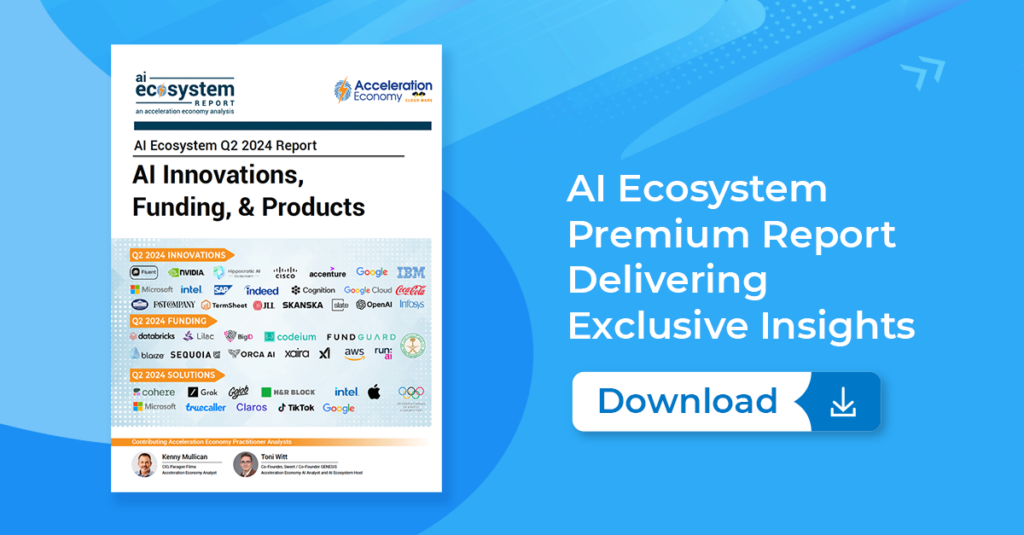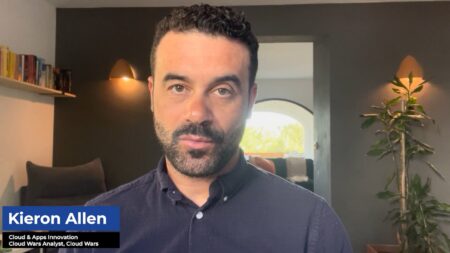
Oracle’s Executive Vice President of Applications Development, Steve Miranda, chats with Bob Evans about the benefits of Oracle’s embedded AI approach, how the company leverages AI and integrated applications to deliver faster and more accurate results, and the impact of these innovations on business outcomes and operational efficiency.

The AI Ecosystem Q2 2024 Report compiles the innovations, funding, and products highlighted in AI Ecosystem Reports from the second quarter of 2024. Download now for perspectives on the companies, innovations, and solutions shaping the future of AI.
Highlights
Oracle’s AI-Driven Application Strategy (00:48)
Oracle is the only company that’s both in the infrastructure business as well as in the cloud application business (ERP, Supply Chain, HCM, and CX). It offers AI services at the infrastructure level for companies that are building their own apps.
Last year, Oracle introduced over 50 distinct use cases for generative AI within applications — among them, helping with job post creation, item description, and narrative reporting. This year, it’s announcing 50-plus AI agents. It’s basically leveraging AI to perform more comprehensive transactions — things like benefits agents, general ledger (GL) assistant agents, and around CX, proposal generation.
How is Oracle different? The benefits of having a single, integrated suite of applications; the data security and service level agreements with customers; and, finally, usage of the world’s leading LLMs in the context of the applications.
Consolidating Data for Speed & Accuracy (02:49)
Consolidating data into a single location and minimizing peripheral systems result in more accurate information, reduced data movement, faster data processing, and greater automation. Steve believes that Oracle provides the broadest suite of applications among SaaS vendors to support customers in this data consolidation journey.
He notes that his applications team is fully focused on application use cases, while the infrastructure teams led by Juan Loaiza in databases and Clay Magouyrk in OCI infrastructure excel in their fields. Steve’s team is confident that it has the best utilities at its disposal.
AI-Driven Innovation & Fast Results (05:15)
Oracle’s 10,000-plus customers use the same version of its software and receive all updates. This means the 50 use cases deployed have been actively used, allowing Oracle to monitor their success, fine-tune them, and incorporate customer feedback. Over 80% of product features come from customer ideas.
On September 9, Oracle announced its earnings, achieving this in just four or five business days thanks to its integrated suite and AI-driven processes. The continuous close process provides real-time data for CEO Safra Catz and other business leaders, enabling faster decision-making. This efficiency not only results in the quickest close but also reduces audit costs and delivers information more rapidly.
Ask Cloud Wars AI Agent about this analysis
Pricing for Applications and AI Tools (07:36)
On the application side, Oracle’s customers pay for world-class SaaS financials, HCM products, and supply chain products. AI is a utility that makes those products better, so Oracle is not charging extra for an AI feature. In fact, it is so quickly becoming the norm that AI will become embedded in everything. Oracle’s adding AI as a feature, just like the 100 other features it had before.
At the end of the day, it’s business outcomes that customers pay Oracle for. AI is a very popular tool and transformative tool right now. But it’s ultimately a tool to help develop applications and, as such, Oracle charges for applications.
Reflecting on Customer Success (10:55)
In Steve’s CloudWorld session, Oracle has three customers speaking; nearly every session features customers sharing their experiences. These customers have successfully navigated various stages of their journey and now they are entering the next phase: optimizing their continuously updated applications to further evolve their business processes. By integrating AI and the AI agents, it can accelerate changes to their business processes even more.
What excites Steven most in his conversations with customers these days is that the focus has shifted away from technical debt or version nuances — issues that SaaS addresses seamlessly. Instead, the conversation centers on their top five business metrics, whether it’s speed of closing, inventory cycle times, or lead conversions and customer experience. By identifying these key metrics, Oracle and his team can tailor their feature functions, including AI capabilities, to help them enhance their business performance.
Examples of AI Agents Enhancing Business Operations (12:56)
Steve provides examples of the new AI agents, some of the simpler ones for clarity. There’s a benefits agent at Oracle, which supports its 100,000+ employees by answering questions about leave, medical coverage, and other benefits. Employees can ask about extending leave with vacation time, prescription needs, or using vision care funds, and the AI agent responds using the benefits policy uploaded to a secure Oracle database.
Similarly, on the financial side, it has a GL agent designed for internal finance analysts and controllers. This agent helps with month-end close analysis, report reconciliation, and trend identification. It answers questions about general ledger entries and provides detailed backups, including journal entries, invoices, purchase orders, and workflow approvals.
AI Agents: Transforming Proposal Generation and Availability (15:57)
Steve points out that having AI write proposals is even better than having someone do it manually. Oracle’s AI agents offer contextual support by integrating CX and ERP applications. This enables the generation of highly tailored proposals using comprehensive data on customers, including their product usage and received discounts. While competitors recognize the need for data integration, the real value lies in combining and contextualizing data for actionable insights.
Oracle has already launched the first 50 AI agents, with another 50 set to be introduced over the next nine to twelve months. Many of these will debut in our upcoming release, 24D, and continue with 25A, 25B, and 25C next year.
CloudWorld Thoughts (17:41)
Steve encourages everyone to attend CloudWorld or watch the videos online. Oracle takes great pride in showcasing its customers’ successes and is committed to sharing their stories. Feedback from customers and prospects highlights the value of these real-world success stories. Oracle is thrilled when its customers share their experiences, as it demonstrates the impact of its solutions. Attendees will find many valuable examples and business outcomes from those who have achieved remarkable success with Oracle’s products.

The AI Ecosystem Q2 2024 Report compiles the innovations, funding, and products highlighted in AI Ecosystem Reports from the second quarter of 2024. Download now for perspectives on the companies, innovations, and solutions shaping the future of AI.










